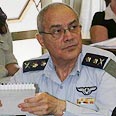
Breaking the cover-up chain
Despite spins, Israel hasn't won any conflict since 1973
"We reached all our objectives as early as the first days of the war"; "We destroyed the Zelzal missiles"; "Nasrallah's declaration that he would have refrained from abducting the soldiers had he predicted Israel's powerful response is testament to the blow he suffered" – those are random examples of the idle cover-up chatter that the defense establishment and its emissaries in the media impose on us.
We must not under any circumstances buy into this flawed merchandize, and not only because it's fundamentally false, but mostly because it joins a series of cover-ups and deception that goes back to the first Lebanon war and continues to this day.
If we fail to break this chain of denial and self-deception, we can expect a catastrophe of a much greater scope in the future.
The bitter truth must be told: Since the 1973 Yom Kippur War, the IDF has been unable to reach a military victory in any conflict. Moreover, even if our opponents failed to win, we ended up with an embarrassing draw in the first Intifada and we lost the al-Aqsa Intifada and the second Lebanon war.
This assertion is based on a paradoxical fact: Each one of the conflicts featured an immense gap in our favor in all major aspects, both qualitative and quantitative. Despite this, we failed to bring the Palestinians to surrender in the first and second Intifadas and were forced to withdraw from Lebanon with our tail between our legs after many years of pointless fighting against an organization that emerged thanks to our invasion.
The recognition that the Intifada has no military solution and the acceptance of a ceasefire without military victory in Lebanon, as much as those were justified both diplomatically and morally following long years of basing our actions exclusively on military strategy, constitute a subconscious acknowledgment of our failure.
If this isn't a failure, what is?
We did even worse in the second Lebanon war. During the 33 days of fighting, missile attacks on northern Israel did not cease. Meanwhile, Hizbullah's fighting ability and spirit were almost unscathed and according to all indications its ability to rehabilitate will enable it to regain its previous strength within months.
If this isn't a failure, what is? The political echelon should be paying the political price for embarking on this war of deception, and the way to punish the leadership is through public protest and through the ballot box – not through commissions of inquiry.
If the politicians remain in place, there will be no significance to the political result test of the democratic process. However, the central thing that a commission of inquiry can expose and recommend a remedy for is the government's preparatory work and its decision-making process.
As to the military leadership, rolling heads there is not enough, as justified as this may be. The time has come for an in depth examination of fighting theory, extracting ourselves from the technology cult that has failed time and again in low-intensity conflicts, and severing the umbilical cord tying policing and occupation acts to the building of our military power and fighting theory.
That is, we must remove IDF soldiers from checkpoints, settlements, and Palestinian towns and reintroduce a regime of training and operational preparations.
The time has come to bring back strategic and tactical creativity and leadership that combines the values of integrity and maintenance of the "purity of arms" and morals during fighting, as well as strategic ingenuity and the ability to lead combat maneuvers. Mostly, the time has come to disconnect the IDF from politics and minimize the defense establishment's control over the formulation of policy.
Only a political leadership able to put the IDF in its place as a servant of foreign and defense policy and not as a replacement for it, alongside military leadership that recognizes the limits of power and is able to build a fighting theory and optimal military force in the framework of these constraints, can lead Israel to substantial diplomatic achievements – and to military accomplishments if needed.
Zeev Maoz is a Political Science professor at Tel Aviv University and the University of California, Davis










